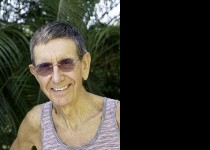传记
In the world of art, Carl Aylen’s work is unique. This one-of-a-kind award-winning abstract artist and former Cambridge Don has mastered the creation of highly color-vibrant abstracts in the extremely demanding medium of pen and ink.
Many of the abstract art drawings displayed here are influenced by his algorithmic abstraction methodology developed while teaching at Cambridge University.
Dr. Aylen uses no mechanical or computer-based aids in the production of his drawings, all of which are produced entirely by hand. Additionally, the description and poem, which are included with each drawing are both written entirely by Dr. Aylen.
A three-day show of his drawings, each of which contains a strong philosophical message, is due to be held in the world-renowned Kipling Gallery in Toronto later this year.
After starting life as an engineering apprentice, Dr. Aylen went on to become the only graduate in his year to obtain a First-Class Honours degree in Mechanical Engineering at Bath University in the UK.
His subsequent research in the field of metal fatigue led to the development of his first major algorithm. This became known as the Constant-Strength Fatigue theory and transformed the dynamic analysis of complex moving structures. It was used in the design of the world-leading supersonic Concorde passenger airplane.
As far as is known, he is the only person in British history to be granted a special dispensation to be admitted to the postgraduate Ph.D. degree within the statutory minimum two-year period.
As a postgraduate student, Dr. Aylen became involved in the field of medical engineering and collaborated on the pioneering design of a cranial electrical probe frame. This was used in the treatment of Parkinson’s disease where it guided electrical probes into specific areas of the brain and facilitated the burning of brain tissue to eliminate hand tremors.
As a postgraduate student, Dr. Aylen became involved in the field of medical engineering and collaborated on the pioneering design of a cranial electrical probe frame. This was used in the treatment of Parkinson’s disease where it guided electrical probes into specific areas of the brain and facilitated the burning of brain tissue to eliminate hand tremors.
Later, as a post-doctoral research fellow, and the only mechanical engineer ever to be awarded the prestigious ICI Post-Doctoral Fellowship, Dr. Aylen developed an algorithm for the analysis of stress resulting from supersonic shock waves. This algorithm was used in the design the UK’s Fibreglass Minesweepers.
Subsequently, Dr. Aylen studied English Law (University of London), Roman Dutch Law (UNISA) and International Arbitration, Humanitarian and Human Rights Law (Leiden University).
Dr. Aylen’s first business commercialized his invention of the photo-optic credit-card system. This was used throughout parts of Europe for many years prior to the development of the magnetic strip credit card and used a unique high-security algorithm.
In his early career as an entrepreneur, Dr. Aylen appeared regularly as a guest both on British Television and as a Member of the Massachusetts Institute of Technology Panel on matters related to technological innovation. The Financial Times, a world-famous British newspaper, has written extensively about his inventions.
After selling his credit card business, Dr. Aylen became a professor at Cambridge University and a contemporary of the late Stephen Hawking.
While working within the university’s Department of Architecture, he became interested in behavioral science and, in particular, the impact which architectural design concepts could have on human motivation. It was during this time that he discovered the mathematical links between personality and motivational factors.
Dr. Aylen’s research while a professor at Cambridge University ultimately led to his development of a groundbreaking series of algorithms that modelled the way in which “order” is created out of “chaos”. The experience he gained in developing these algorithms now guides the way in which his unique “order” from “chaos” abstract art is created.
After his time at Cambridge University, the groundbreaking nature of his work linking personality and motivational factors was recognized and he was invited to become a Professor working within Stirling University’s Centre for Cognitive and Computational Neuroscience in Scotland. During his three years at Stirling University, Dr. Aylen used Artificial Neural Networks to turn his personality-motivational model into the now world-famous Performance Profile.
Subsequent to this, Dr. Aylen formed a business in London where his Performance Profile underpinned his work as a consultant specializing in corporate reconstruction. He advised members of Margaret Thatcher’s Cabinet on matters related to the Prime Minister’s privatization program covering British Coal, British Rail, British Steel, and the introduction of market-led processes and joint Emergency Treatment-General Practitioner Triage Centers into the British National Health Service.
He also participated in the reconstruction of a number of well-known commercial organizations including International Computers, Dunlop, Lloyds of London, Shell Oil, ESSO, and Society Generale, to name but a few.
Subsequently, he invented and developed Talent Chaser. This Artificial Intelligence Platform uses mathematical algorithms to help a global roster of clients to improve the way in which they shortlist job applicants and manage and retain talented staff.
His algorithms are now used in advanced search engines and as the basis of the AI system underpinning Talent Chaser. Dr. Aylen is a member of the Senate at Cambridge University and an Alum of Cambridge in America and a member of both the Council for Tall Buildings and the Association of Test and Survey Publishers.
He was also involved in the reconstruction of a number of well-known commercial organizations including International Computers, Dunlop, Lloyds of London, Shell Oil, ESSO, and Society Generale, to name but a few.
He served for a period as a member of the Police Dependent’s Trust in London, UK and, together with his wife Marita, became founding patrons of the Police National Orchestra.
His Audio program, “Prime Thing Skills” published by Nightingale Conant on MP3 is a world-wide best seller.
